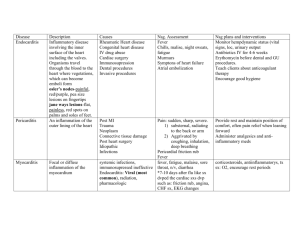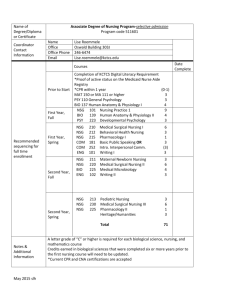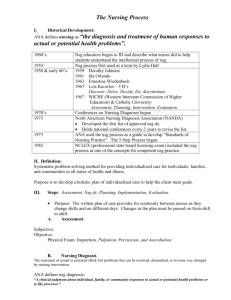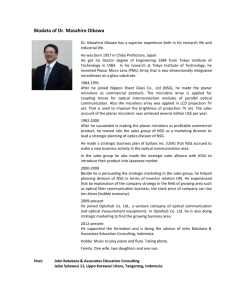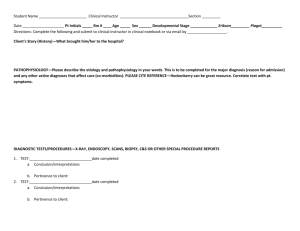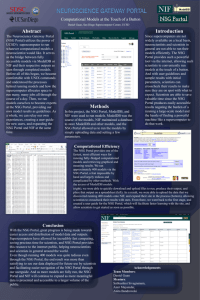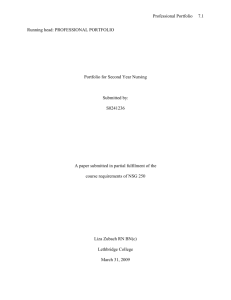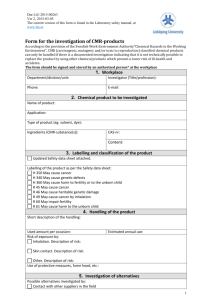An overview of the National School of Government: Requirements
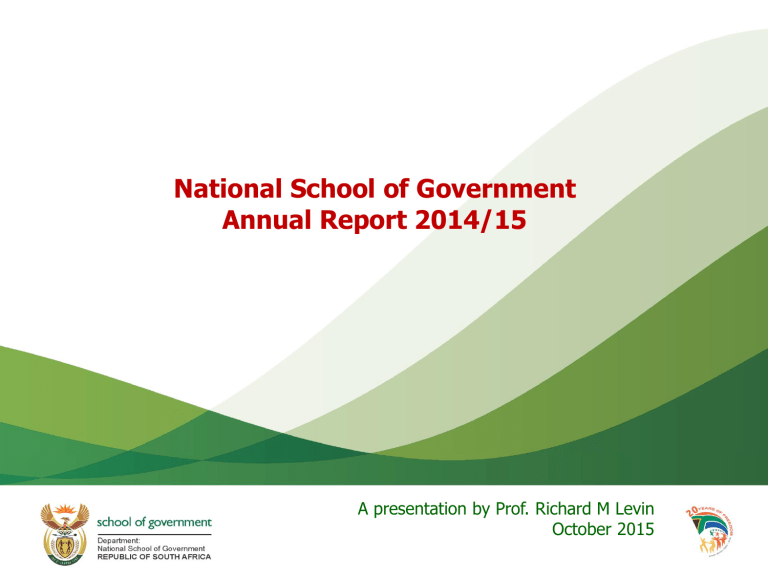
National School of Government
Annual Report 2014/15
A presentation by Prof. Richard M Levin
October 2015
6.
7.
4.
5.
8.
9.
1.
2.
3.
Outline of Presentation
Mandate
Strategic Overview
Summary of Performance
3.1
3.2
3.3
3.4
Branch: Corporate Management
Office of the Chief Financial Officer
Branch: Training Policy and Planning
Branch: Specialised Services
3.5
Branch: Training Management & Delivery
HR Oversight
Summary of Financial Performance
Financial and Non-Financial Performance for 2015/16
MTEF Budget Allocation and Priorities beyond 2015
Recommendations
Conclusion
2
Mandate and Current Service Delivery Model for the National School of Government
Mandate
There shall be a training institution listed as a national department
(in Schedule 1).
The management and administration of such institution shall be under the control of the Minister.
Delivery and Funding Model
•NSG provides training to public servants using own and contracted training facilitators, as well as through partnerships with higher education institutions
Such institution-
(1)shall provide such training or cause such training to be provided or conduct such examinations or tests or cause such examinations or tests to be conducted as the Head of the institute may with the approval of the Minister decide or as may be prescribed as a qualification for the appointment or transfer of persons in or to the public service;
• Training is provided in the four streams of:
Leadership, Management, Administration &
Induction
• Cost recovery Model using the Training
Trading Account
(2)may issue diplomas or certificates or cause diplomas or certificates to be issued to persons who have passed such examinations.
Legislative Developments
The assenting of the Public Administration Management Act, 2014 by the President has extensive implications for the NSG, primarily being its establishment as a higher education institution
3
Financial and Non-financial Performance for 2014/15
4
Strategic Overview of 2014/15
Strategic outcome-oriented goals
For the five year period, the institution set the following strategic goals:
A fully established, well-functioning and high performing
National School of Government responding to the developmental agenda of the State
A well-resourced funding mechanism that supports financial viability and sustainability for NSG activities
Human resource capacity with sufficient capabilities to respond adequately to the strategic imperatives of the
NSG
Effective learning and development opportunities in the public sector supported by credible quality assurance processes and centrally managed uniform norms and standards
Well-structured and effective strategic national and international partnerships which influence and enhance public sector learning and development interventions
Enhanced marketing and visibility of NSG products and services
The quality and levels of performance of public sector institutions are improved through strategic diagnosis and targeted interventions
Knowledge resource centre that is accessible for evidencebased learning and development with well researched, reliable and relevant materials
Curriculum, programmes and services adequate for departmental needs and effectively responding to sectoral and institutional needs
Strengthened and stabilised political-administrative interface in the public sector through a framework of specifically designed programmes
Effective implementation of in-service learning and development across the public sector
Dedicated attention to the present and future needs of a professional and responsive public sector
5
Strategic Overview of 2014/15
Programme and Budget Structure
Programme 1: Administration
This programme facilitates the overall management of the School and provides for responsibilities of the Principal, Branch Heads and other members of management.
The above programme is structured as follows:
Office of the Principal comprising the Office of the CFO and Internal Audit
(outsourced)
Corporate Management comprising Strategic Planning and ICT, Corporate Services,
International & Special Projects, Communications as well as Legal, Compliance and
Contract Management
6
Strategic Overview of 2014/15
Programme and Budget Structure
Programme 2: Public Sector Organisational and Staff Development
This programme facilitates the transfer of payments to the Training
Trading Account for management development and training of the public sector employees
The above programme is structured as follows:
Training Policy and Planning comprising Research and Innovation, Monitoring and Evaluation, Policy and Planning Coordination, Norms and Standards
Training Management and Delivery comprising Induction, Leadership,
Administration, Management, Technical Support and Marketing
Specialised Services comprising Curriculum Design and Development, Quality
Assurance, Accreditation, and ELearning
7
Summary of performance
In September 2014, the Public Service Commission undertook a study on the effectiveness of training provided by PALAMA in improving skills and competencies, and found that:
PALAMA is addressing the skills shortage by designing programmes that are meant to develop employee skills
There is relevance in the training offered and learners gain in-depth understanding of the link between government objectives and their responsibilities
Members of the SMS are of the view that the training has had a positive impact on their performance
The study recommended that:
The NSG should conduct a holistic assessment on capacity building programmes for SMS
Assess whether the current performance management and development system is assisting in identifying, addressing and improving organisational performance
Implement measures to foster positive attitudes to serve citizens professionally and in line with Batho Pele
8
Summary of Performance Against APP Targets
Number of persons trained per stream
16000
14000
12000
10000
8000
6000
4000
2000
0
9675 9649
3544
14055
Leadership Management Administration Induction
1670
BB2E
9
25
Summary of Performance Against APP Targets
Performance Status per Branch
20
15
10
5
0
Targets achieved
Targets not achieved
Corporate Management
21
12
Specialised Services
4
0
Training Management &
Delivery
8
11
Training Policy and
Planning
13
2
Office of the CFO
7
2
10
Summary of Performance
Branch: Corporate Management
Fifteen departmental policies were developed and approved for implementation
Strategic Plan and Annual Performance Plan tabled and implemented. The NSG also developed an operational plan, which informed the development of individual performance agreements, performance agreements signed by May 2014
Since the launch of the NSG, work has been undertaken towards revamping the website to be more functional and up-to-date
Organisational risk assessments undertaken and action plans have been developed
Contracts and service level agreements of outsourced service providers were managed on a monthly basis
International capacity building partnerships and programmes were managed during this reporting period
The Disaster Recovery Solution has been deployed, and the NSG has also undertaken a refresher of all old and aging hardware
11
Summary of Performance
Office of the Chief Financial Officer
All payments were made within 30 days of the receipt of invoice
8 verification audits for inventory and assets were performed
Conceptual document on funding model developed
The NSG received 100% compliance with the National Treasury Requirements on procurement
The outstanding debt still remains high, with departments still not making payments for services rendered. This, despite measures in place to follow up with departments.
This has led the NSG to take a stance of issuing a circular to all departments, instructing payment prior to the training being offered, this will commence in
2015/16 financial year
12
Summary of Performance
Training Policy and Planning
M&E policy framework was approved and has been implemented
62 on-site evaluations were undertaken and 100% of all programmes and courses monitored through reaction evaluation questionnaires
3 Application of learning study of 3 NSG programmes completed
State of the Public Service in Africa (SOPSA) report was produced and tabled at the AMDIN workshop. This report will be reworked depending on Africa-wide progress with the greater SOPSA project
A comprehensive report on the Compulsory Induction Programme was finalised. This will also inform policy development and further rollout of the induction programme
The final report on the Base Line Study conducted for the Legislative Sector was presented at National Parliament and submitted to the Legislative Sector
13
Summary of Performance
Specialised Services
3 new programmes/ courses completed (CIP Levels 13-14; Lead Facilitator
Development Programme for Reorientation; Lead Facilitator Development
Programme for Citizen Centred Service Delivery)
18 existing programmes reviewed, and 14 programmes were quality assured
NSG accredited by the QCTO as a Skills Development Provider on 07 November
2014, and by the QCTO as an Assessment Centre on 23 February 2015
Undertook 20 eLearning interventions, including fully technology mediated courses and online communities of practice
14
Summary of Performance
Training Management and Delivery
The Executive Development Programme (EDP) certification ceremonies were held in April and May of 2014. In total, 128 managers were awarded the Certificate in Executive Leadership after successfully completing six core modules
The NSG convened a series of 1-day workshops for senior managers in the public service, facilitated by an internationally renowned visiting scholar, Prof Al Gini
The NSG was selected as the preferred service provider by the SAPS (HAWKS) in the training of 245 officials in SCM, Contract management, Inventory and storage management, project management, Detection and
Combating Bid rigging and Strategic HR Planning offerings. Furthermore, a partnership was established with
National Treasury, with a commitment of R500, 000 for the funding of the training rollout of Standard Chart of
Accounts and Economic Reporting Format (SCOA & ERF) for practitioners
A Training-of-trainers session was conducted on the United Nations Agency (UNDESA) Toolkit on Disability for
Africa in support for the implementation of the Convention on the Rights of Persons with Disabilities (CRPD)
The NSG hosted a very successful Public Sector Trainers’ Forum (PSTF) Conference from 24-26 November
2014. The conference was attended by close to 500 national and international speakers and delegates.
Awards were also conferred to best performing training facilitators and institutions.
NSG is committed to supporting government initiatives on youth oriented programmes. In 2014/15, a total of
1670 rural unemployed graduates benefited in the NSG joint initiative with the Department of Rural
Development and Land Reform
15
Summary of Performance
Areas for improvement
The Portfolio Committee has been briefed on the options being piloted, focusing on the
Compulsory Induction Programme (13-14), Performance Management & Development
System, Government Leadership Platform, and an international exchange programme with the China Academy of Governance
The NSG also acknowledges the lack of capacity and strength in its marketing initiatives, and is committed towards a new approach
The NSG is also at an advanced stage of the Trainer Capacity Development Programme.
A total of 775 public servants from all provinces were identified and trained as facilitators for the Compulsory Induction Programme
The NSG is gearing towards achieving high volume training, especially through eLearning
16
Summary of Performance
Human Resource Oversight
Employment and vacancies by programme as on 31 March 2015
Programme
Programme 1
Programme 2
Total
Number of posts on approved establishment
90
137
227
Number of posts filled
79
113
192
Vacancy Rate
12.2%
17.5%
15.4%
Employment and vacancies by salary band as on 31 March 2015
Salary band Number of posts on approved establishment
Number of posts filled
Vacancy Rate
Senior management
(13-16)
Highly skilled supervision (9-12)
Highly skilled production (6-8)
Skilled
(3-5)
Total
50
80
72
25
227
38
63
68
23
192
24%
21.2%
5.6%
8%
15.4%
Number of employees additional to the establishment
6
6
-
Number of employees additional to the establishment
6
6
17
Summary of Performance
Human Resource Oversight
EMPLOYMENT EQUITY
Including employees with disabilities as at 31 March 2015
Female
Male
Persons with disabilities
Female-Male ratio at SMS level
63%
37%
3%
50%-50%
SIGNING OF PERFORMANCE AGREEMENTS: SMS members as on 31 August 2014
SMS Level Total number of funded SMS posts
1
Total number of
SMS members
1
Total number of signed performance agreements
1
Signed performance agreements as % of total number of SMS members
100% Principal/ Head of
Department
Salary Level 16
Salary Level 15
Salary Level 14
Salary Level 13
Total
3
16
30
50
2
15
21
39
2
14
19
36
100%
93.3%
90.5%
92.3%
18
Summary of Financial Performance
Vote 12a
APPROPRIATION
STATEMENT
Adjusted
Appropriati on
Administration
R'000
82,911
Shifting of
Funds
R'000
-
Appropriation per programme
2014/15
Viremen t
Final
Appropriati on
Actual
Expenditur e
R'000
-
R'000
82,911
R'000
78,293
Varianc e
R'000
4,618
Expenditure as % of final appropriati on
%
94.4%
2013/14
Final
Appropriati on
Actual
Expenditur e
R'000
82,922
R'000
85,622
Public Sector
Organisational and Staff
Development
TOTAL
55,597
138,508 -
-
-
55 597
138,508
55,597
133,890
-
4,618
100.0%
96.7%
49,000
131,922
49,000
134,622
The total expenditure breakdown of R133 million spent in 2014/15 and spending patterns compared to the 2013/14 financial year is summarised as follows:
Programme1. Administration: Compensation of employees for the Vote-funded staff component of NSG increased by
1.9% from R36.2 million (2013/14) to R36.9 million in 2014/15, due to salary adjustments. Goods and services decreased by 23.6% from R47.9 million (2013/14) to R 36.6 million in 2014/15. The decrease is based on the implementation of the
National Treasury cost cutting measures and reduction on costs for advisory task team consultants. Expenditure on capital assets increased by 207% from R1.3 million (2013/14) to R4.2 million in 2014/15. The increase is due to replacement of aging non-compatible computer hardware.
Programme 2. Public Sector Organisational and Staff Development: The transfer of funds from Vote to the TTA increased by 13.3% from R49.0 million (2013/14) to R55.5 million in 2014/15.
19
Summary of Financial Performance
Training Trading Account
Training Trading Account
REVENUE
Revenue from exchange transactions
Revenue from non-exchange transactions
EXPENDITURE
Employee benefits
Operating expenses
SURPLUS FOR THE YEAR
Note
3
4
5
6
2014/15
R'000
149,849
94,252
55,597
(148,825)
(61,471)
(87,354)
1,024
2013/14
R'000
158,189
107,984
50,205
(157,955)
(58,202)
(99,753)
234
20
Summary of Financial Performance
Training Trading Account
Training Trade Account
A trading entity established in terms of the PFMA. The statements are prepared in accordance with Standards of
Generally Recognised Accounting Practice (GRAP). To achieve full compliance with accrual accounting requirements, the prescribed financial accounting system of the trading entity is supplemented by additional manual procedures.
Total revenue (including the transfer of funds from the Vote appropriation) decreased by R8.3 million from
R158.1 million (2013/14) to R149.8 (2014/15), a decrease of 5.3%. Income from course fees decreased by
14.4%, from R102.1 million (2013/14) to R87.3 million (2014/15). Transfer funds from Vote to Trade increased by R6.5 million from R49.0 million in 2013/14 to R55.5 million in 2014/15.
Total expenditure in the TTA decreased by R9.1 million from R157.9 million (2013/14) to R148.8 million in
2014/15. The decrease is mainly attributable to the following:
•
•
Operating expenses decreased from R99.7 million in 2013/14 to R87.3 million in 2014/15. This is mainly due to low training interventions conducted.
Compensation of employees increased by 5.2% from R58.2 million in 2013/14 to R61.4 million in 2014/15.
The increase is inflationary related and vacancies filled during the year. ( Programme 2 employees budgeted under this account )
The TTA closed the year with a surplus of R0.2 million in 2013/14 and the closing status in 2014/15 is a surplus of R1.0 million
21
Summary of Financial Performance
Overall
Unqualified Audit Report for the 7 th year running
Virement/ Roll overs
No virement was requested during the financial year under review.
Irregular Expenditure
A total of R420 000 was incurred as irregular expenditure during the financial year and condoned as the
Department did not suffer any financial loss due to these transactions. The reasons for the irregularities relate to non-adherence to procurement approval process for deviations. The NSG will ensure that all officials are aware of supply chain processes and regulations and that they adhere to them.
Public Private Partnerships (PPP)
The NSG did not enter into any PPP contracts during the 2014/15 financial year.
Supply Chain Management
All official assets captured in the asset register and the register complies with the minimum requirements as set by National Treasury. In order to strengthen asset management and minimise the risk of loss of assets, quarterly asset verifications are conducted and reports presented to the Executive Management Committee.
All payments processed within 30 days
22
Financial and Non-financial Performance for 2015/16
23
NSG Strategy for 2015-2020
Strategic Outcome Goals
A fully established, well-resourced and high performance institution
Improved learning and development opportunities influenced by impactful research, strategic diagnosis and monitoring and evaluation
Cutting-edge learning and development tools, quality-driven curriculum, programmes and services responding to public service needs and training, staff development and support
Integrated and collaborative network of learning and development institutions and practitioners providing the public service with affordable access to quality learning and development opportunities
24
NSG Strategy for 2015-2020
Strategic Objectives for Programme 1 (Administration)
Implement effective policies, strategies and plans that comply with legislation, good corporate governance principles and improved organisational performance standards
Efficient and effective fiscal, infrastructure and human resource planning and management to support the sustainability of the institution
Co-ordinate the utilisation of donor funded resources and international cooperation agreements towards improving human capacity development
25
NSG Strategy for 2015-2020
Strategic Objectives for Programme 2 (Public Sector Staff and Organisational
Development)
Implement effective research, knowledge management and diagnostic strategies to inform learning and development needs and opportunities
Implement an effective monitoring and evaluation framework to monitor the quality of learning and development interventions and evaluate the effectiveness of interventions on performance based on set norms and standards
Design and quality assure accredited and non-accredited curriculum which responds to public service needs, individual career pathing and lifelong learning
Manage an integrated and collaborative network of local and international learning and development institutions and practitioners to provide learning and development opportunities
Train on NSG curriculum, programmes and services with access to learning and development opportunities that provide quality training, learner materials and effective learner support
Provision of reliable and accurate learning and development information through the integration of core records management systems
26
NSG Strategy for 2015-2020
Training delivery targets per training stream
Stream
Induction &
BB2E
Administration
Management
Leadership
TOTAL
2015/16
32 100
2016/17
22 750
2017/18
23 000
2018/19
23 000
2019/20
23 000
5 150
11 900
10 900
60 500
5 350
13 500
11 000
52 600
5 550
15 100
11 100
54 750
5 750
16 700
11 300
56 750
6 000
18 300
11 500
59 000
Year 1 is inclusive of addressing the CIP implementation backlog
Projected figures are not inclusive of new programmes based on ministerial directives, or the review of the current suite of programmes
27
Summary of Financial and Non-financial Performance
Over the last two quarters, the NSG has trained a total of 8,499 public servants in all training streams and has additional confirmed booking for 17,800 public servants
Revenue generation based on the cost recovery model over a 6-month period amounted to
R22.2 million
The NSG has implemented the system of pre-payment for programmes and courses, which is resulting in improvements in payments by departments. Prepaid confirmed bookings for quarter 3 & 4 amounts to R15.8 million
As part of the trainer capacity development, the NSG is doing final field testing on the Lead
Facilitator Development Programme in relation to the Re-orientation Programme and the
Citizen-centred Service Delivery Programme
As reported previously to the Portfolio Committee, the NSG has commenced with the piloting options – Compulsory Induction Programme, Performance Management Course, NSG
Leadership Platform and the International Exchange Programme
The hosting of the PSTF Conference, in partnership with the Northern Cape Provincial
Government, from 5-7 October 2015
28
MTEF Budgetary Allocation
29
Beyond 2015 Priorities
The NSG cannot maintain a contracted brokerage service in supporting the constrution of a South African Developmental State. This requires public service policy shifts including an overarching training policy, as well as amendments to the existing public service wide
PMDS to enable public servants to become training facilitators
The NSG must broaden its focus, especially in light of the PAM Act, to focus on local government education and learning, while also focusing on expanding its work in the legislative sectors. This will add more to the research work and diagnostic /needs analysis
The NSG requires further ICT investment to support the extensive training coverage, particularly mandatory programmes through online courses, as well as expanding its depth and reach. Institutionally, the enterprise architecture should provide for core institutional systems supporting learner records and content management also adding assessment work as part of its responsibilities
A fully-fledged campus with classrooms and infrastructure supporting education and learning is the most critical additional requirement in the next MTEF
30
MTEF Allocation Vote Account
16/17 15/16
Current
Budget
17/18
R'000
VOTE
Administration
Public Sector Organisational and Staff Development
Total
84 289
55 247
139 536
MTEF
90 367
56 009
146 376
MTEF
98 842
57 720
156 562
18/19
MTEF
104 384
60 580
164 964
R'000
VOTE
Compensation of Employees
Goods and Services
Capital Assets
Transfer to Trading Entity
Total
15/16
Current
Budget
47 790
34 141
2 358
55 247
139 536
16/17
MTEF
51 766
36 243
2 358
56 009
146 376
17/18
MTEF
55 288
41 090
2 464
57 720
156 562
18/19
MTEF
58 493
43 295
2 596
60 580
164 964
31
MTEF Allocation Trade Account
15/16 16/17 17/18
Current
Budget MTEF MTEF R'000
TRADE
Gross Revenue (Mainly Course Fees)
Interest received
Transfer from the Vote
Total TRADE Revenue
Total TRADE Expenditure
Compensation of Employees
Goods and Services
Surplus/Deficit
143 632
2 319
55 247
201 198
201 198
82 070
119 128
-
150 971
2 434
56 009
209 414
209 414
88 490
120 924
-
158 669
2 556
57 720
218 945
218 945
94 507
124 438
-
18/19
MTEF
167 184
2 693
60 580
230 457
230 457
99 989
130 468
-
32
Recommendations
On the 2014/15 financial and non-financial performance, it is recommended that the Portfolio
Committee:
Notes the performance of the National School of Government for the financial year within the budget vote as confirmed by Parliament and the unqualified audit issued by the Auditor-General
Notes some of the institutional challenges in meeting performance targets and improvement areas going forward
On the 2015/16 financial and non-financial performance, it is recommended that the Portfolio
Committee:
Notes the second quarter performance of the National School of Government
On the MTEF allocation, it is recommended that the Portfolio Committee:
Notes the pilot programmes are being implemented utilising the existing budget
Notes that the post-pilot implementation will require additional resources, which are currently being costed
33
Conclusion
The NSG remains committed towards improving the skills capacity in the public service, ensuring efficient application of knowledge in the workplace
There are areas of improvement that have been identified for addressing in the
2015/16 financial year, and these improvement areas have been shared with the Portfolio Committee
We are reminded of the words of the late Minister Chabane:
“A second important recommendation from the NDP, is strengthening the capacity of the state, through appropriately suitable skilled and qualified personnel. The National School of Government has been tasked with addressing this gap and we are back to the drawing board and going back to basics as we are cognizant that the universities are in the business of transferring knowledge and the Public Service workplace is responsible to turning these into usable skills which are capable to transform the state”
34
Enkosi, Realeboga, Dankie, Thank you
35
